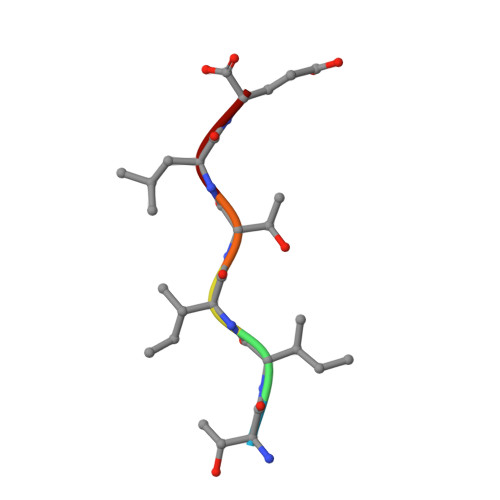A Designed Inhibitor of p53 Aggregation Rescues p53 Tumor Suppression in Ovarian Carcinomas.
Soragni, A., Janzen, D.M., Johnson, L.M., Lindgren, A.G., Thai-Quynh Nguyen, A., Tiourin, E., Soriaga, A.B., Lu, J., Jiang, L., Faull, K.F., Pellegrini, M., Memarzadeh, S., Eisenberg, D.S.(2016) Cancer Cell 29: 90-103
- PubMed: 26748848
- DOI: https://doi.org/10.1016/j.ccell.2015.12.002
- Primary Citation of Related Structures:
4RP6, 4RP7 - PubMed Abstract:
Half of all human cancers lose p53 function by missense mutations, with an unknown fraction of these containing p53 in a self-aggregated amyloid-like state. Here we show that a cell-penetrating peptide, ReACp53, designed to inhibit p53 amyloid formation, rescues p53 function in cancer cell lines and in organoids derived from high-grade serous ovarian carcinomas (HGSOC), an aggressive cancer characterized by ubiquitous p53 mutations. Rescued p53 behaves similarly to its wild-type counterpart in regulating target genes, reducing cell proliferation and increasing cell death. Intraperitoneal administration decreases tumor proliferation and shrinks xenografts in vivo. Our data show the effectiveness of targeting a specific aggregation defect of p53 and its potential applicability to HGSOCs.
- Departments of Biological Chemistry and Chemistry and Biochemistry, UCLA-DOE Institute, HHMI, 611 South Charles E. Young Drive, Los Angeles, CA 90095-1570, USA.
Organizational Affiliation:

















